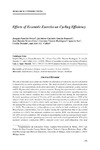Please use this identifier to cite or link to this item:
https://accedacris.ulpgc.es/jspui/handle/10553/6513
| Title: | Effects of eccentric exercise on cycling efficiency | Authors: | Moysi, JS Garcia-Romero, Jerónimo Alvero-Cruz, José Ramón Ara, Ignacio Dorado, C Dorado, Cecilia Calbet, José A.L. |
UNESCO Clasification: | 241106 Fisiología del ejercicio | Keywords: | Performance Fatigue Muscle soreness Lactate Triathlon |
Issue Date: | 2005 | Journal: | Canadian Journal of Applied Physiology | Abstract: | The aim of this study was to find out whether the efficiency of concentric muscle contraction is impaired by eccentric squatting exercise. The study involved 25 male physical education students in two experiments. In the first experiment 14 subjects undertook cycling exercise at 65% VO(2)max until exhaustion on two occasions. During the experimental condition their cycling was interrupted every 10 min so they could perform eccentric squatting exercise, whereas in the control condition they rested seated on the bike during the interruptions. Eccentric squatting consisted of 10 series of 25 reps with a load equivalent to 150% of the subject's body mass on the shoulders. During the first experiment gross efficiency decreased (mean +/- SE) from 17.1 +/- 0.3 to 16.0 +/- 0.4%, and from 17.2 +/- 0.3 to 16.5 +/- 0.4%, between the 2nd and 9th cycling bouts of the experimental and control conditions, respectively (both p < 0.05). The reduction in cycling efficiency was similar in both conditions (p = 0.10). Blood lactate concentration [La] was higher during the experimental than in the control condition (p < 0.05), but substrate oxidation was similar. MVC was decreased similarly (25-28%) in both conditions. The 11 subjects participating in the second experiment undertook 25 reps of eccentric squatting exercise only, each with a load equivalent to 95% of his maximal voluntary contraction (MVC), repeated every 3 min until exhaustion. One hour after the end of the eccentric squatting exercise series cycling, VO(2) and gross cycling efficiency were comparable to the values observed before the eccentric exercise. Both experimental protocols with eccentric exercise elicited similar muscle soreness 2 days later; however, at this time cycling efficiency was similar to that observed prior to eccentric exercise. The interposition of cycling exercise between the eccentric exercise bouts accelerated the recovery of MVC. We conclude that eccentric exercise does not alter or has only a marginal effect on gross cycling efficiency even in presence of marked muscle soreness. | URI: | https://accedacris.ulpgc.es/handle/10553/6513 | ISSN: | 1066-7814 | DOI: | 10.1139/h05-119 | Source: | Canadian Journal of Applied Physiology[ISSN 1066-7814],v. 30, p. 259-275 |
| Appears in Collections: | Artículos |
SCOPUSTM
Citations
11
checked on Jun 8, 2025
WEB OF SCIENCETM
Citations
10
checked on Jun 8, 2025
Page view(s)
115
checked on Jan 11, 2025
Download(s)
264
checked on Jan 11, 2025
Google ScholarTM
Check
Altmetric
Share
Export metadata
This item is licensed under a Creative Commons License

